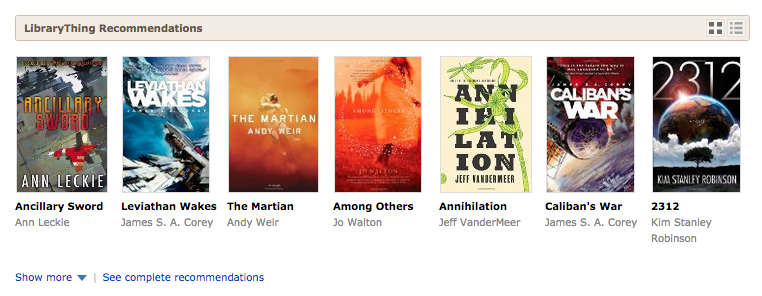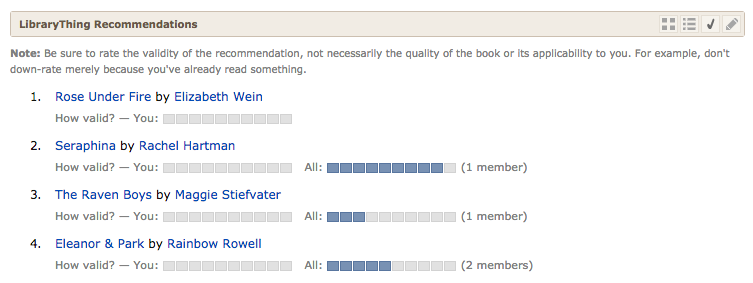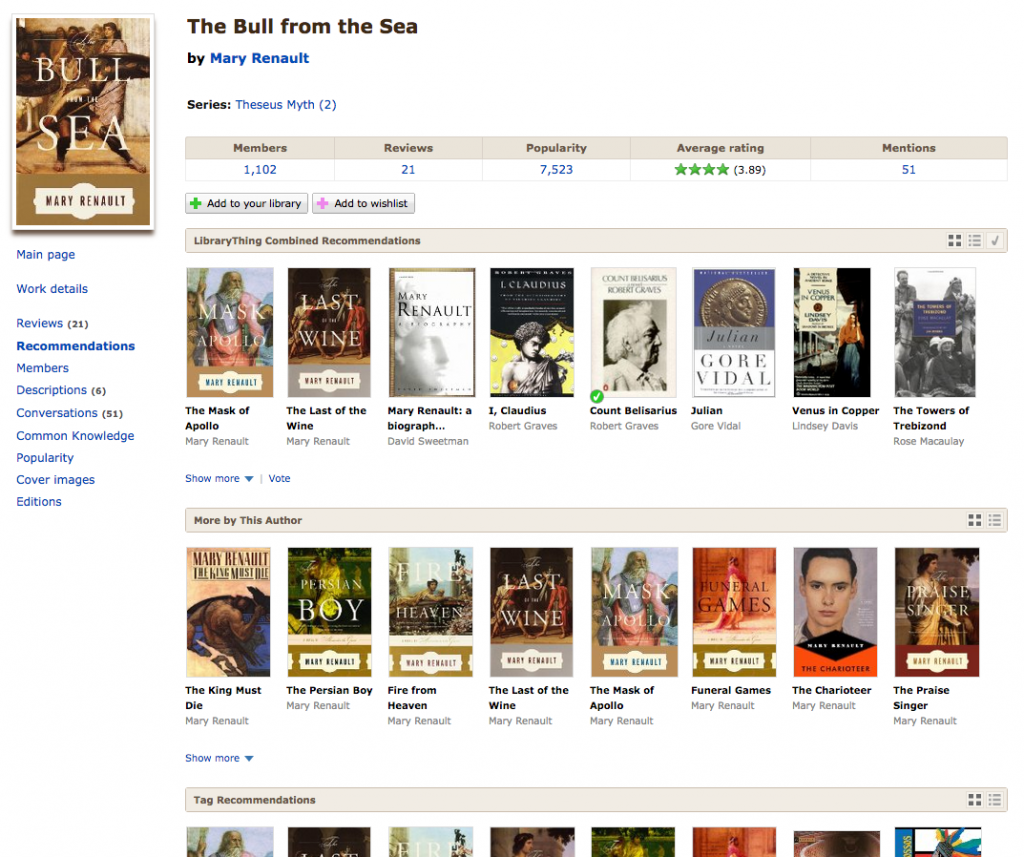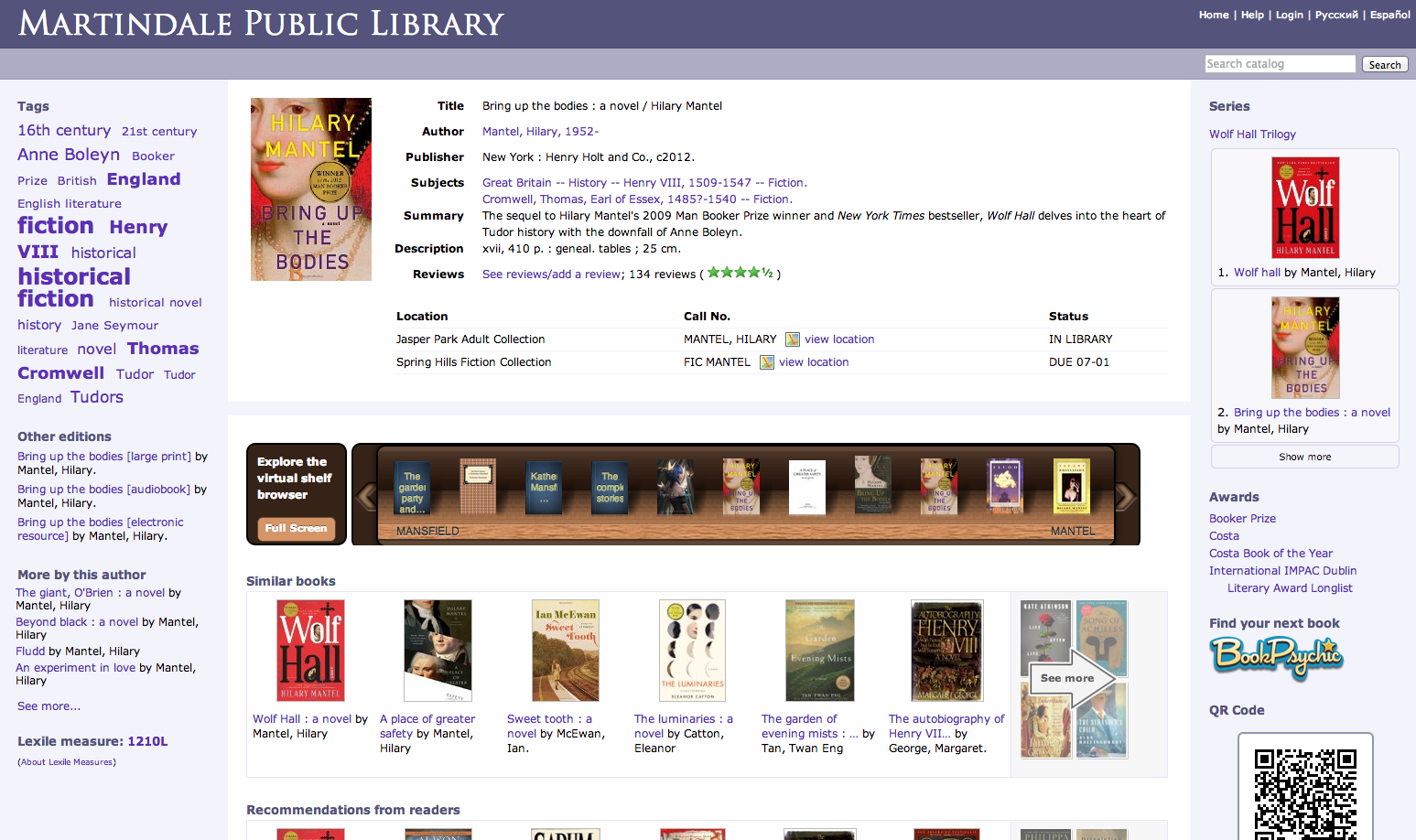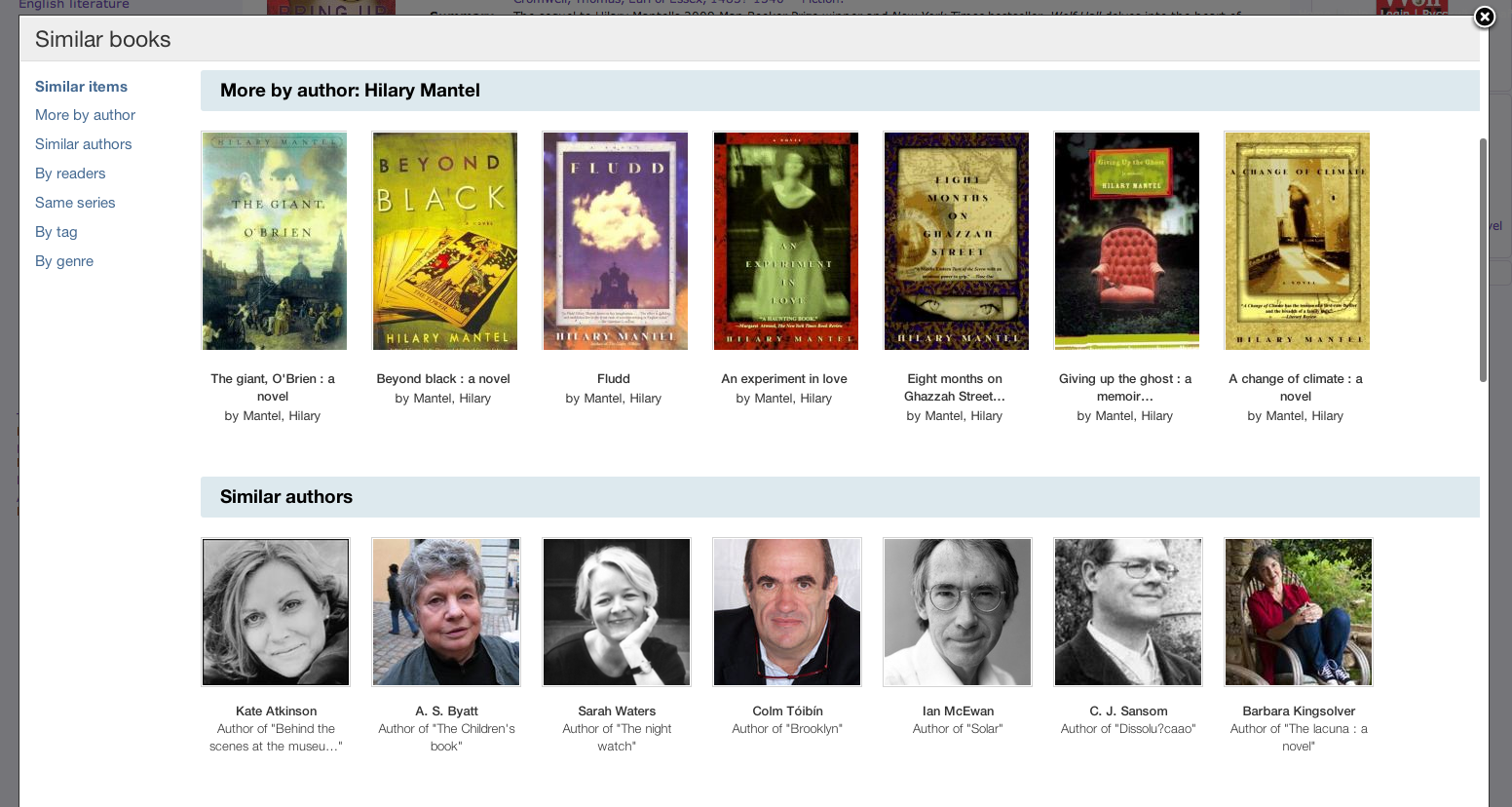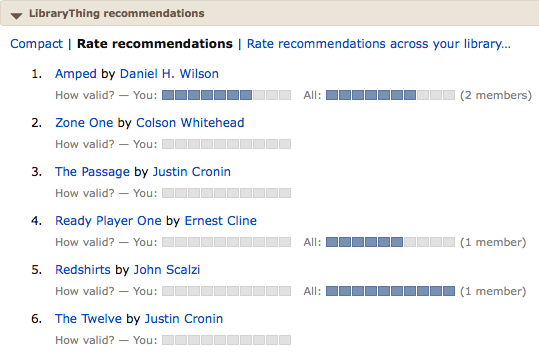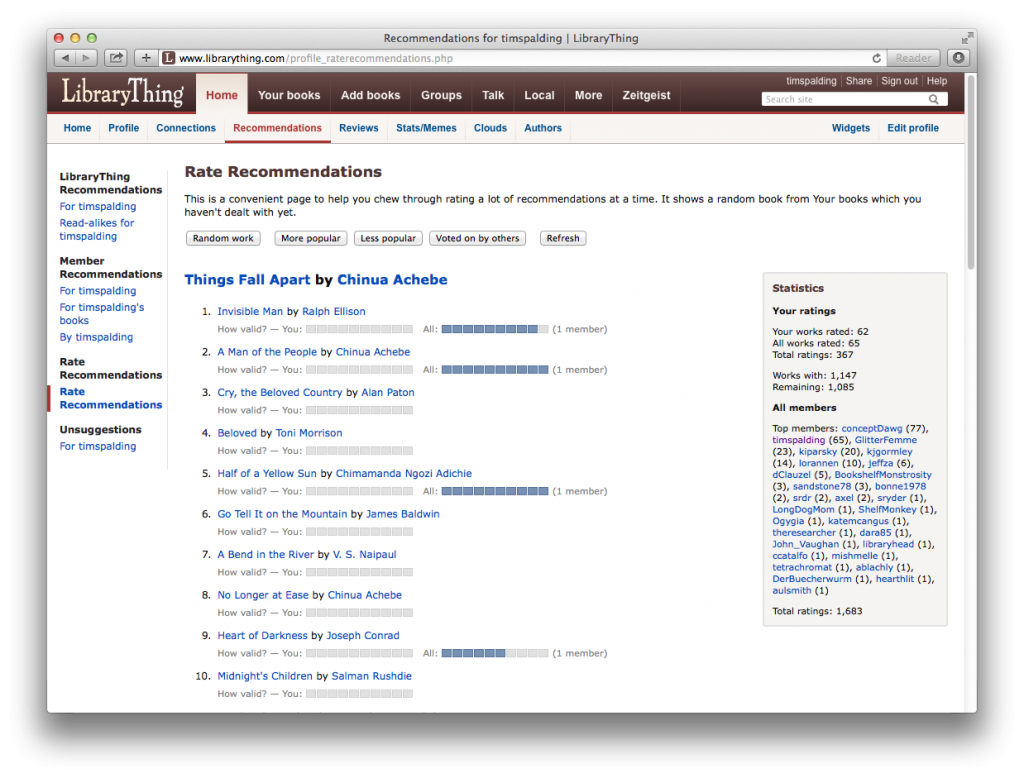
It’s become a LibraryThing tradition: as the year draws to a close, LT staff members list of their top five reads (you can see 2013’s list here)—this is our fourth year running!
We also want all members to get in on the fun, so we compiled a list that all of LibraryThing can add to. We’d like to see not just the most read books of 2014, but the best of the best. What were your five favorite reads of 2014? Note: books on this list weren’t necessarily released in 2014. These are just the best we’ve read this year, regardless of publication date.
» List: Top Five Books of 2014 — Add your own.
Without further ado, here’s the wordier breakdown of the staff’s favorites, including some honorable (and dishonorable) mentions:





The Quick by Lauren Owen
Tell the Wolves I’m Home by Carol Rifka Brunt
Outlander by Diana Gabaldon
Astonish Me by Maggie Shipstead
The Paying Guests by Sarah Waters
Abby’s honorable mentions:





Ancillary Justice by Ann Leckie
This space opera won lots of awards in the last year, and with good reason. It’s not only good sci-fi, but it poses interesting questions about AI, the self, and identity. Well worth a read.
Saga, Vol. 1 by Brian K. Vaughan
A sci-fi/fantasy mish-mosh that revolves around an interplanetary civil war, this one finally convinced me to start reading comics regularly.
Hard-Boiled Wonderland and the End of the World by Haruki Murakami
I first picked this up a couple years ago, but couldn’t get into it until this year. It’s a bit slow to start, and is as obtuse as any Murakami novel, but I really enjoyed it. If the intersection of “melancholy” and “bizarre” sounds appealing, you should check it out.
Texts from Jane Eyre by Mallory Ortberg
Imagined text conversations between characters and authors of the classics. I still find myself quoting Ortberg’s version of Achilles sometimes.
Yes Please by Amy Poehler
It was an interesting look into the mind of a woman whose career I greatly admire, and that made it worthwhile for me. I laughed, I cried.
Loranne’s dishonorable mentions:
- The Shambling Guide to New York City by Mur Lafferty: This skewed a little more YA than my tastes typically lean, so perhaps I should have known better. But, I picked it up for book club and was just kind of disappointed. It left a bad taste in my mouth.
- The Dog Stars by Peter Heller: Another selection for book club. If I have to read one more book by a male author in which the curves of an inanimate object are likened to those of a woman’s body (either specific or general), I will light something on fire. Aside from that, it wasn’t a bad book, per se, just very much not my thing.





The Paying Guests by Sarah Waters
Where’d You Go Bernadette by Maria Semple
Code Name Verity by Elizabeth Wein
The Night Circus by Erin Morgenstern
The Storied Life of A.J. Fikry by Gabrielle Zevin
The books that really stand out, however, read to or with my eight year-old son, Liam. Reading is always a big part of our life, but it was especially so during the two periods when my wife was away at a writing colony. We had a lot of lengthy drives listening to audiobooks, and sometimes even listened to audiobooks during dinner. We’re running out of stuff to read!





Treasure Island by Robert Louis Stevenson
Read it with my son. I had never read it before. It’s a ripping yarn, and it’s main character, Long John Silver, remains a cultural touchstone.
Pollyanna by Eleanor H. Porter
Audiobooked with my son. It’s a classic that appears to have slipped off the classics shelf. That’s too bad. Despite having virtually no action, my son adored it.
Tunnel in the Sky by Robert A. Heinlein
Audiobooked with my son. I have a soft spot for this imperfect juvenile, and we were on a Robinsonade kick. The “let down” (with strong messages about adolescence) were his first exposure to such an ending—and not well received. Tor.com has a good post about it, “Beware of stobor!”.
A Wizard of Earthsea by Ursula K. Le Guin
Hadn’t read it since I was a teenager. It’s better than I remember.
The Martian by Andy Weir
Hugely enjoyable account of an astronaut stranded on Mars. (I’ve audiobooked it three times.) I interviewed the author for our newsletter.
Tim’s dishonorable mentions:
- The Time Warp Trio series by Jon Scieszka: Not three but sixteen books about three travelleing friends. They’re fine—many steps up from that execrable Magic Tree House series—and I’m glad my son got what amounts to a tour of history. But I hope to never read another sentence by Jon Scieszka.
- The Engines of God by Jack McDevitt: Why do I bother reading science fiction?
- The Kraken Wakes by John Wyndham*: See above. Boringly sexist too.
- The Brothers Karamazov by Fyodor Dostoevsky: It’s pure gold, and doing it by audiobook left me swimming in Dostoyevsky-prose for weeks. But I left off reading in the middle and have to start again; I can’t read something unless I’m fully “up” on it—unless I feel like I’m holding the whole thing in my mind. Maybe next year…
*Perhaps a better question is “Why do I bother reading John Wyndham?” considering The Midwich Cuckoos made Tim’s “dishonorable mentions” last year…





The Secret Place by Tana French
Tana French is always worth the wait. This book did not disappoint.
The Silkworm by Robert Galbraith
More Cormoran Strike, please. Vying with French’s Dublin Murder Squad as my favorite series.
We Were Liars by E. Lockhart
I love an unreliable narrator and already regret giving my copy of this book away.
Not That Kind of Girl by Lena Dunham
Biggest surprise of the year for me, especially considering how much I was looking forward to Amy Poehler’s debut, which I’m finally brave enough to say I straight-up hated.
The Quick by Lauren Owen
Thanks to Abby Blachly for the recommendation.





The Last Lion, Vol. 1: Winston Churchill, Visions of Glory by William Manchester
Project Azorian: The CIA and the Raising of K-129 by Norman Polmar
The Bully Pulpit: Theodore Roosevelt, William Howard Taft, and the Golden Age of Journalism by Doris Kearns Goodwin
How Not to Be Wrong: The Power of Mathematical Thinking by Jordan Ellenberg
Ancillary Justice by Ann Leckie





We Are Not Ourselves by Matthew Thomas
This is both really long and really sad. I loved it, but it’s hard to recommend to people.
Station Eleven by Emily St. John Mandel
NOT over-hyped. In a sea of post-apocalyptic throwaway books, this literary novel brought art back to humanity, even after the “end of the world.”
The Lobster Kings by Alexi Zentner
As a Mainer who loves Shakespeare, I was the perfect audience for this take on King Lear. I shoved it on anyone in my tiny fishing town who would stand still long enough.
Cinnamon and Gunpowder by Eli Brown
Everyone loves lady pirates, blowing up the unethical opium trade, and lavish descriptions of food preparation. Everyone.
The Lunatic, the Lover, and the Poet by Myrlin A. Hermes
Always here for queering Shakespeare texts.
KJ’s honorable mentions:





Faithful Place by Tana French
Words of Radiance by Brandon Sanderson
While You’re Here, Doc by Bradford B. Brown
The Birth Partner by Penny Simkin
Organic Chemistry I As a Second Language by David R. Klein





What If? Serious Scientific Answers to Absurd Hypothetical Questions by Randall Munroe
The Way of Kings by Brandon Sanderson
The Slow Regard of Silent Things by Patrick Rothfuss
The Walking Dead: Compendium One by Robert Kirkman
The Life of Corgnelius and Stumphrey by Susie Brooks





Chaos: Making a New Science by James Gleick
Doing Data Science by Rachel Schutt
Statistical Inference for Everyone by Brian S. Blais
Machine Learning with R by Brett Lantz
Unity 4.x Game Development by Example by Ryan Henson Creighton





No Death, No Fear by Thich Nhat Hanh
Thich Nhat Hanh is such a great writer for those who practice the philosophies of Buddhism. His writing is simple, reflective, and he repeats a lot of the same lessons over so you can internalize those lessons much easier.
Reading the Forested Landscape: A Natural History of New England by Tom Wessels
This one was a re-read; the illustrations are beautiful! You’ll never look at a New England landscape the same again after reading this book.
Edible Perennial Gardening: Growing Successful Polycultures in Small Spaces by Anni Kelsey
I read this book after buying my first home and taking a permaculture course online. This is a great guide for designing your perennial/permaculture garden! I can’t wait to build my garden at home!
The Elements of Style (Illustrated) by William Strunk
I was recommended this book from a colleague when I asked for good books to improve my writing skills! A great book for the foundations of the English language and writing.
The pH Miracle: Balance Your Diet, Reclaim Your Health by Robert O. Young
I have continued to read this book over the last year or two, as a way to improve my health and reduce/eliminate my digestive issues. Following the pH diet principles has saved my health!





JavaScript: The Good Parts by Douglas Crockford
Code Complete by Steve McConnell
Practical Vim: Edit Text at the Speed of Thought by Drew Neil
Rework by Jason Fried
The Pragmatic Programmer by Andrew Hunt
More?
Tell us about your favorites for 2014 on Talk, or add your own Top Five to our list!

